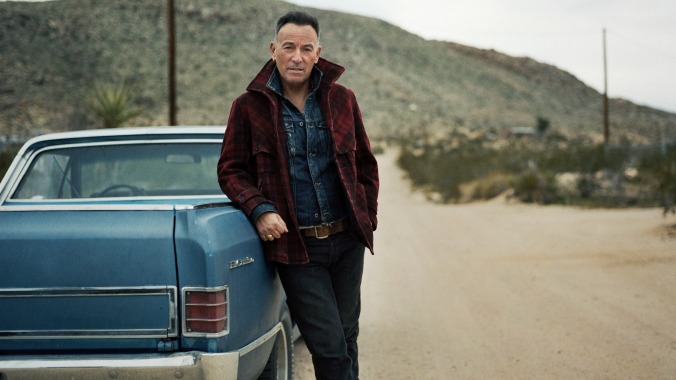Bruce Springsteen has spoken repeatedly about the influence of cinema on his music. Throughout the years, in numerous interviews (and his recent autobiography), he conjures impressions and memories of films that imprinted on his mind at a young age, and how the bold narratives and striking imagery of classics from the ’60s and ’70s helped him shape his own lyrical characters and musical journeys. And now, 18 albums and nearly 50 years into his career, his new album sounds for all the world like a soundtrack to a movie that doesn’t exist—and in the very style of those long-ago pictures that so moved him.
The press materials for Western Stars, the Boss’ new solo release without his trusty E Street Band, have said the album is a tribute to the Southern California pop of his youth. But its influences seem much more midcentury cinematic Americana. The sweeping, bombastic scores of Alfred Newman or the populist orchestral sounds of Aaron Copland are more immediate reference points than a stylish Laurel Canyon aesthetic. Nearly every song slowly builds in like manner to a swelling eruption of strings, horns, and more, with a front-loaded mix that sees this instrumentation drown out the guitars and rhythm sections that function as the skeletal frame. It conjures up the vision of some forgotten Altman-esque road trip movie of the mid-’70s, but it also tends to swallow up the Springsteen-ness of it all, like Springsteen is fading into the background of his own music, the cinematic world in which he’s always envisioned his characters now taking over wholesale. Remembrance of that bygone era is no longer one influence among many, but all there is.
This is most evident in tracks like “Chasin’ Wild Horses,” with its violin melody prefacing his mournful lyrics about the pains of living a life without the hope for something more. What begins with a simple accompaniment of guitar plucks and a loping, brushes-on-snare rhythm, delicate and evocative, slowly builds until the strings take over, the too-loud arrangements weakening instead of elevating the material. It’s a variant of the problem he had on Lucky Town: Where that record tried too hard to recreate the rock ’n’ roll revivalist-tent salvation vibe—a hallmark of his live performances—by adding ingredients until the songs became weighted down by pomposity, this one traffics too much and too directly in the ’70s Americana that affected him. He’s chasing a sound defined largely by nostalgia, and if anyone should know the dangers of trying to recapture the past, it’s Springsteen.
That’s not to say the record is misconceived. Some of the songs are indeed best captured by the sweeping scope of orchestral grandeur that the musician (aided by producer Ron Aniello, who’s been working with the Boss since 2012’s Wrecking Ball) has crafted alongside a small army of collaborators, mostly string and horn players, though longtime musical friends like former E Streeter David Sancious pop up in small amounts as well. The best example of this method succeeding is “Stones,” the album centerpiece. With a languid and potent rhythm, his repeated refrain of “Those are only the lies you’ve told me” takes on a cathartic beauty, the blend of strings and guitars working in perfect tandem, showing there can be a fusion of these tools that works. It’s terrifically moving, lush and expertly layered in ways that exceed the simple and predictable bombast of the other arrangements.
But among successes like the bracing “Tucson Train” or steel guitar swing of the title track, there’s clunkers like “Sundown” or “There Goes My Miracle,” full of the kinds of blunt-force mixing effects that have bogged down Springsteen’s studio tracks throughout his career—a sure sign of the musician trying too hard and playing around in the studio for too long. Despite the latter’s memorable refrain melody, it features some of the most treacly writing of his career: “Heartache, heartbreak… the book of love holds its rules / disobeyed by fools.”
There’s an overwhelming consistency to Western Stars, a welcome quality after the scattershot kitchen-sink approach of 2014’s High Hopes. (The most welcome development, though, is that Tom Morello and his caterwauling guitar solos are nowhere to be found.) And the leftover influence of Springsteens’s Seeger Sessions work that recurred throughout his last couple releases has been fully purged. Still, the larger-than-life arrangements that feel perfectly calibrated to the cheap seats when executed by a world-class rock ’n’ roll band end up sounding reductive (and at times, dangerously close to Muzak) when translated into the sounds of a mini-orchestra. It’s a delight to hear the man summon the musical spirits of his past, but it’s all a bit overly tasteful and mannered to have the force as his usual work. The rough-around-the-edges element of his music has always been a highly calculated aspect of Springsteen’s perfectionist tendencies, but in crafting this record of genteel retro Americana, his smooth sound is missing some bite.

 Keep scrolling for more great stories.
Keep scrolling for more great stories.
